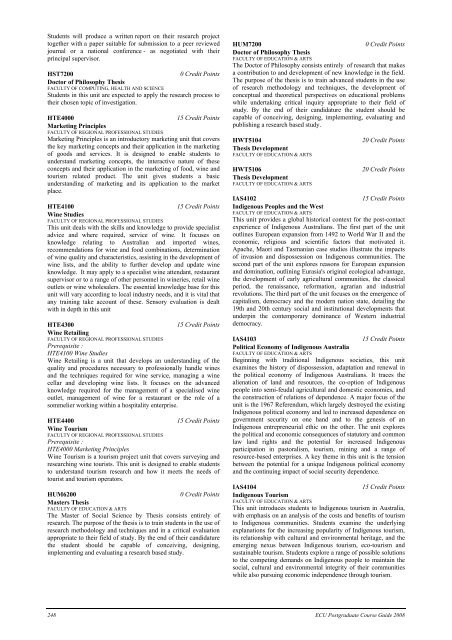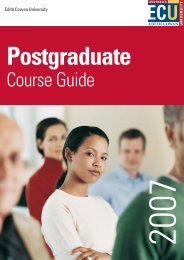Postgraduate - Edith Cowan University
Postgraduate - Edith Cowan University
Postgraduate - Edith Cowan University
Create successful ePaper yourself
Turn your PDF publications into a flip-book with our unique Google optimized e-Paper software.
Students will produce a written report on their research project<br />
together with a paper suitable for submission to a peer reviewed<br />
journal or a national conference - as negotiated with their<br />
principal supervisor.<br />
HST7200 0 Credit Points<br />
Doctor of Philosophy Thesis<br />
FACULTY OF COMPUTING, HEALTH AND SCIENCE<br />
Students in this unit are expected to apply the research process to<br />
their chosen topic of investigation.<br />
HTE4000 15 Credit Points<br />
Marketing Principles<br />
FACULTY OF REGIONAL PROFESSIONAL STUDIES<br />
Marketing Principles is an introductory marketing unit that covers<br />
the key marketing concepts and their application in the marketing<br />
of goods and services. It is designed to enable students to<br />
understand marketing concepts, the interactive nature of these<br />
concepts and their application in the marketing of food, wine and<br />
tourism related product. The unit gives students a basic<br />
understanding of marketing and its application to the market<br />
place.<br />
HTE4100 15 Credit Points<br />
Wine Studies<br />
FACULTY OF REGIONAL PROFESSIONAL STUDIES<br />
This unit deals with the skills and knowledge to provide specialist<br />
advice and where required, service of wine. It focuses on<br />
knowledge relating to Australian and imported wines,<br />
recommendations for wine and food combinations, determination<br />
of wine quality and characteristics, assisting in the development of<br />
wine lists, and the ability to further develop and update wine<br />
knowledge. It may apply to a specialist wine attendant, restaurant<br />
supervisor or to a range of other personnel in wineries, retail wine<br />
outlets or wine wholesalers. The essential knowledge base for this<br />
unit will vary according to local industry needs, and it is vital that<br />
any training take account of these. Sensory evaluation is dealt<br />
with in depth in this unit<br />
HTE4300 15 Credit Points<br />
Wine Retailing<br />
FACULTY OF REGIONAL PROFESSIONAL STUDIES<br />
Prerequisite :<br />
HTE4100 Wine Studies<br />
Wine Retailing is a unit that develops an understanding of the<br />
quality and procedures necessary to professionally handle wines<br />
and the techniques required for wine service, managing a wine<br />
cellar and developing wine lists. It focuses on the advanced<br />
knowledge required for the management of a specialised wine<br />
outlet, management of wine for a restaurant or the role of a<br />
sommelier working within a hospitality enterprise.<br />
HTE4400 15 Credit Points<br />
Wine Tourism<br />
FACULTY OF REGIONAL PROFESSIONAL STUDIES<br />
Prerequisite :<br />
HTE4000 Marketing Principles<br />
Wine Tourism is a tourism project unit that covers surveying and<br />
researching wine tourists. This unit is designed to enable students<br />
to understand tourism research and how it meets the needs of<br />
tourist and tourism operators.<br />
HUM6200 0 Credit Points<br />
Masters Thesis<br />
FACULTY OF EDUCATION & ARTS<br />
The Master of Social Science by Thesis consists entirely of<br />
research. The purpose of the thesis is to train students in the use of<br />
research methodology and techniques and in a critical evaluation<br />
appropriate to their field of study. By the end of their candidature<br />
the student should be capable of conceiving, designing,<br />
implementing and evaluating a research based study.<br />
HUM7200 0 Credit Points<br />
Doctor of Philosophy Thesis<br />
FACULTY OF EDUCATION & ARTS<br />
The Doctor of Philosophy consists entirely of research that makes<br />
a contribution to and development of new knowledge in the field.<br />
The purpose of the thesis is to train advanced students in the use<br />
of research methodology and techniques, the development of<br />
conceptual and theoretical perspectives on educational problems<br />
while undertaking critical inquiry appropriate to their field of<br />
study. By the end of their candidature the student should be<br />
capable of conceiving, designing, implementing, evaluating and<br />
publishing a research based study.<br />
HWT5104 20 Credit Points<br />
Thesis Development<br />
FACULTY OF EDUCATION & ARTS<br />
HWT5106 20 Credit Points<br />
Thesis Development<br />
FACULTY OF EDUCATION & ARTS<br />
IAS4102 15 Credit Points<br />
Indigenous Peoples and the West<br />
FACULTY OF EDUCATION & ARTS<br />
This unit provides a global historical context for the post-contact<br />
experience of Indigenous Australians. The first part of the unit<br />
outlines European expansion from 1492 to World War II and the<br />
economic, religious and scientific factors that motivated it.<br />
Apache, Maori and Tasmanian case studies illustrate the impacts<br />
of invasion and dispossession on Indigenous communities. The<br />
second part of the unit explores reasons for European expansion<br />
and domination, outlining Eurasia's original ecological advantage,<br />
the development of early agricultural communities, the classical<br />
period, the renaissance, reformation, agrarian and industrial<br />
revolutions. The third part of the unit focuses on the emergence of<br />
capitalism, democracy and the modern nation state, detailing the<br />
19th and 20th century social and institutional developments that<br />
underpin the contemporary dominance of Western industrial<br />
democracy.<br />
IAS4103 15 Credit Points<br />
Political Economy of Indigenous Australia<br />
FACULTY OF EDUCATION & ARTS<br />
Beginning with traditional Indigenous societies, this unit<br />
examines the history of dispossession, adaptation and renewal in<br />
the political economy of Indigenous Australians. It traces the<br />
alienation of land and resources, the co-option of Indigenous<br />
people into semi-feudal agricultural and domestic economies, and<br />
the construction of relations of dependence. A major focus of the<br />
unit is the 1967 Referendum, which largely destroyed the existing<br />
Indigenous political economy and led to increased dependence on<br />
government security on one hand and to the genesis of an<br />
Indigenous entrepreneurial ethic on the other. The unit explores<br />
the political and economic consequences of statutory and common<br />
law land rights and the potential for increased Indigenous<br />
participation in pastoralism, tourism, mining and a range of<br />
resource-based enterprises. A key theme in this unit is the tension<br />
between the potential for a unique Indigenous political economy<br />
and the continuing impact of social security dependence.<br />
IAS4104 15 Credit Points<br />
Indigenous Tourism<br />
FACULTY OF EDUCATION & ARTS<br />
This unit introduces students to Indigenous tourism in Australia,<br />
with emphasis on an analysis of the costs and benefits of tourism<br />
to Indigenous communities. Students examine the underlying<br />
explanations for the increasing popularity of Indigenous tourism,<br />
its relationship with cultural and environmental heritage, and the<br />
emerging nexus between Indigenous tourism, eco-tourism and<br />
sustainable tourism. Students explore a range of possible solutions<br />
to the competing demands on Indigenous people to maintain the<br />
social, cultural and environmental integrity of their communities<br />
while also pursuing economic independence through tourism.<br />
248 ECU <strong>Postgraduate</strong> Course Guide 2008



